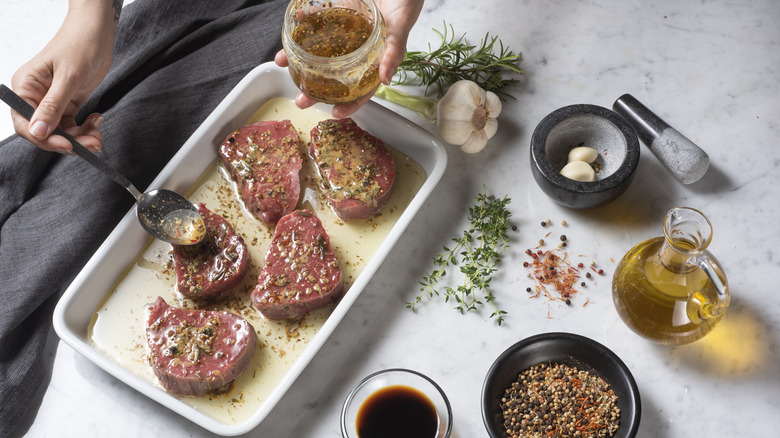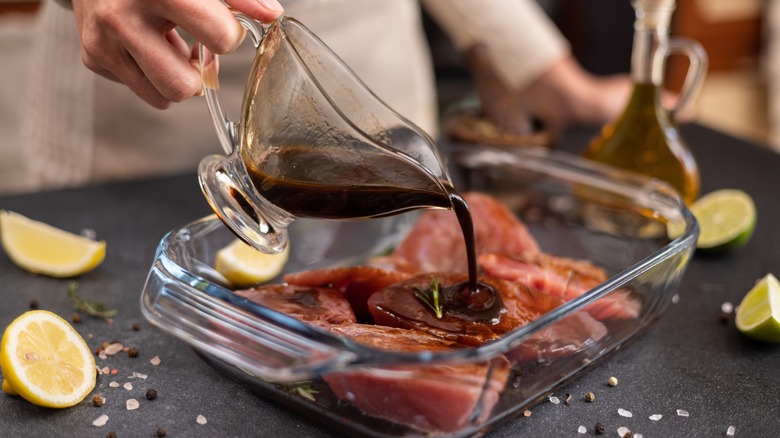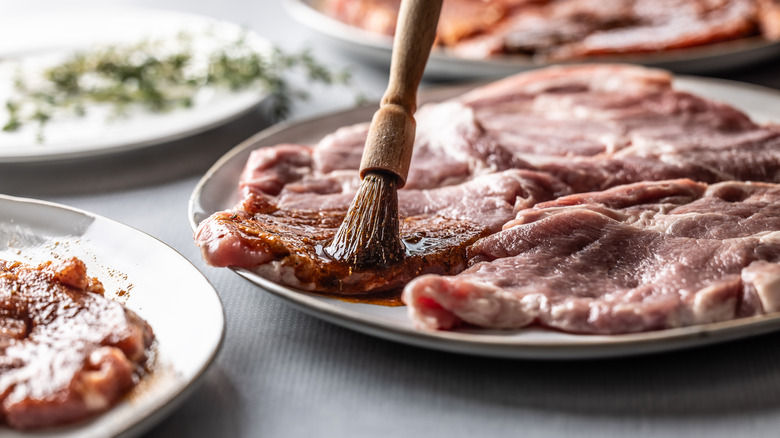A Food Scientist Explains What Really Happens When You Marinate Meat
Even if you're new to cooking, you've likely tasted the difference that a good meat marinade can have on a meal. An easy marinade can make the perfect tri-tip steak or transform a bland chicken or pork dinner into a juicy, flavorful culinary masterpiece. But, while you may have tasted the impact of properly marinated meat, you may not know exactly how the marinade works its magic.
Recognizing the science behind your favorite recipes and their essential components is the key to mastering them and learning how to improvise meals with the ingredients you have in your kitchen, from experimenting to making swaps as needed. To help understand what happens when you marinate meat, Chowhound spoke to Kantha Shelke, Ph.D., CFS (Certified Food Scientist), who you can find on LinkedIn. Shelke is the founder and principal of Corvus Blue LLC (a food science and research firm), a food science communicator for the Institute of Food Technologists, and a senior lecturer on food safety regulations at Johns Hopkins University. Drawing on her vast knowledge of food science, Shelke breaks down how marinades work to tenderize and flavor meat.
A good marinade tenderizes meat
A meat marinade has two main purposes. The first is to tenderize tough meat fibers to make melt-in-your-mouth bites. Kantha Shelke explains how this process takes place due to the acid in marinades. "Meat marinades contain acids ... that denature proteins in meat and essentially break down their structure, making the meat fibers more relaxed and, therefore, more tender," she says.
To ensure this process takes place, your marinade recipe needs to include an acidic ingredient, such as citrus juice, vinegar, tomatoes, and yogurt. Shelke notes a couple of other particularly effective marinade components. "Enzymes from fruits like papaya or pineapple (often used in marinades) further break down muscle fibers," she says. Together, these ingredients help tenderize tough meat to ensure that each bite is succulent and juicy. Plus, they add a delicious tangy flavor to your dishes.
Properly marinating meat will take your recipes to the next level, but it's essential to avoid marinating mistakes that make dishes like salmon mushy. Marinating meat and seafood in an acidic mixture for too long can lead to this undesired outcome.
Marinades add bold, delicious flavor
Flavoring meat and seafood dishes is the second key purpose of meat marinades. Once the marinade breaks down the tough muscles and fibers, it's easier for the meat to absorb the flavors around it. Marinade ingredients boost a meat dish's flavor in a few ways, according to Kantha Shelke. "The liquids in the marinade add moisture to plump up the meat and make it more succulent and allow flavors to penetrate deeper into the meat fibers through a process called osmosis," she says.
This process is aided by any salt and oil present in a marinade. "The salt in the marinade acts as a flavor enhancer and helps draw out moisture from the meat, which is then reabsorbed with the marinade's flavors for a richer taste," Shelke explains. When it comes to oil, she says, "Oil in the marinade serves to spread the flavor of spices and herbs evenly throughout the meat." Ergo, an effective marinade will include acid, oil, salt, spices, and other flavoring ingredients. By properly marinating your meat in these ingredients, you can perfect its texture and flavor.
Of course, there are plenty of ways to make marinated meat more delicious. For instance, follow the science of cooking low and slow when preparing extra-tough cuts of meat for even better results.


